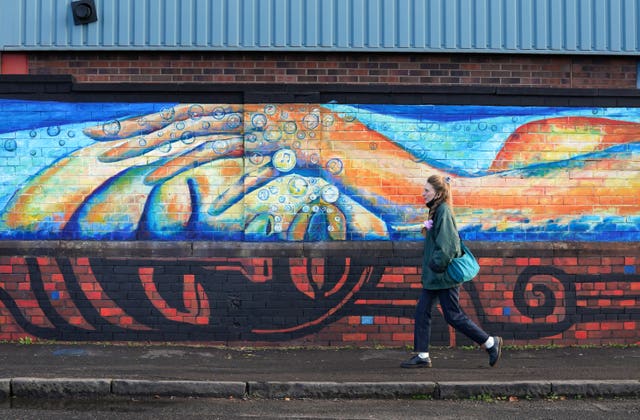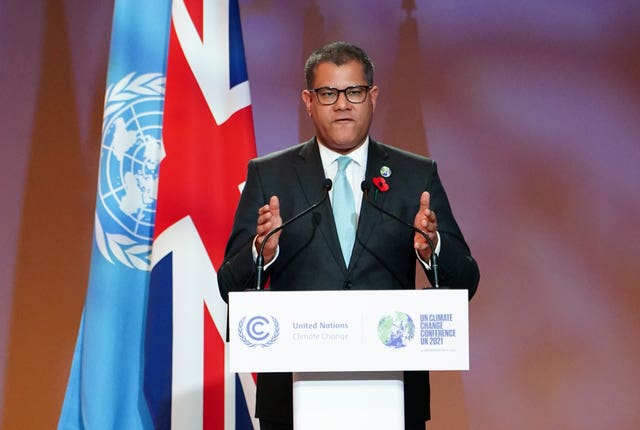World must break dependency on fossil fuels, Sharma urges in climate speech
The Ukraine invasion throws into ‘stark relief’ the dangers of energy systems powered by foreign fossil fuels, the Cop26 president said.

Russia’s invasion of Ukraine throws into “stark relief” the dangers of energy systems powered by foreign fossil fuels, Cop26 President Alok Sharma has said.
Returning to the Glasgow venue for the UN Cop26 summit to mark six months since delegates agreed upon new efforts to tackle climate change, he called for countries to step up the pace on action.
Mr Sharma acknowledged in his speech that the world had changed since the summit, and climate change was no longer on the front pages as war returned to Europe, inflation spiked, energy prices climbed and people continued to deal with the pandemic.
“Yet the current crises should increase not diminish our determination to deliver on what the world agreed here in Glasgow, because they show with devastating clarity why it is imperative to do so, and to do so now,” he urged.
He warned that climate change was a “chronic danger” that the world had to deal with even as countries tackled the other crises in the present.
Mr Sharma said the “brutal and illegal invasion” of Ukraine would define this year and many years to come, and said: “The actions of the Putin regime have pushed up fossil fuel prices globally.
“That has thrown our situation into stark relief. We see clearly the dangers of energy systems powered by foreign fossil fuels.
“We see the benefits of low cost homegrown renewables, the price of which cannot be manipulated from afar.
“In short, we see that climate security is energy security and that we must break our dependency on fossil fuels.”
He admitted countries were taking action to deal with immediate supply issues of fossil fuels but also pointed to increases in renewable deployment, and said the UK would be able to get 95% of its power from low carbon sources by 2030 and be fully decarbonised by 2035.
Mr Sharma called for more action to shift towards a clean future, warning that food security – already under pressure because of famine and now the invasion of Ukraine – would worsen with climate change.
The Met Office has warned the world has a 50-50 chance in the next five years of temporarily exceeding the 1.5C global warming limit which countries pledged to pursue efforts to meet in the Paris Agreement in 2015 and confirmed in Glasgow.
Reports from the UN’s Intergovernmental Panel on Climate Change (IPCC) science body have warned the window to limit temperature rises to 1.5C above pre-industrial levels, the threshold beyond which the worst impacts will be felt, is rapidly closing.
But experts have concluded that if all the pledges made in Glasgow are met, they could curb global temperature rises to below 2C, the higher limit countries promised to meet in the Paris Agreement.
A failure to honour the Cop26 commitments “would be an act of monstrous self-harm”, Mr Sharma warned.
The agreement secured in Glasgow, as the talks ran over by more than a day, called on countries to phase down unabated coal power and phase out inefficient fossil fuel subsidies.
The deal signed by nearly 200 countries also requests they revisit and strengthen targets to cut greenhouse gas emissions by 2030, and urges rich nations to scale up the finance they provide to help more vulnerable countries to develop cleanly and adapt to climate impacts.

Agreements made around the Glasgow Pact also aimed to stop deforestation, accelerate the move to clean cars and provide finance for countries to make a shift away from fossil fuel power in ways that were fair to their citizens.
Mr Sharma demanded that every country must revisit their 2030 carbon-cutting plans and submit more ambitious ones in 2022 if needed to align with the global targets to curb warming under the Paris Agreement.
Speaking at the halfway point between Cop26 and the next round of UN talks in Egypt in November, Mr Sharma said the international system for dealing with climate change was imperfect and unwieldy – but could work.
“It can deliver and it is the best chance we have of tackling climate change. But it is only as strong as the sum of its parts. So we need every nation to pick up the pace.

“We need every leader to show that their words were not hollow, that their commitments were made with integrity, and that they recognise though the immediate challenges we face are great, we will only inflame them if we falter,” he said.
Speaking to journalists after the speech, Mr Sharma said he thought the transition from fossil fuels to clean energy was going to happen much faster in the wake of the war in Ukraine than had previously been envisaged.
He said it was understandable that governments were looking to see how they could meet their immediate energy needs, including boosting fossil fuels, as they had to ensure the lights stayed on and factories were operating.
“But what you’re also seeing is a very clear understanding set out by governments, some of whom are actually quite dependent on Russia for oil and gas, that actually the future is about ensuring that they have homegrown clean energy.
“They have understood that at the end of the day, the way you ensure domestic energy supply is to have renewable energy, to have clean energy, and that way you’re also in a position where price is not going to be manipulated by somebody else,” he said.





